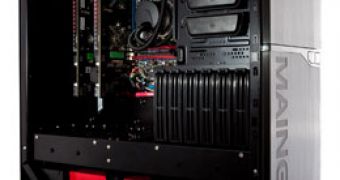Intel's announcement regarding the problems encountered by its 6-series Sandy Bridge chipsets has forced computer manufacturers to take action, Maingear just letting us know that they plan to replace all the buggy motherboards once models based on the new revision of the chipsets become available in mid March.
Just like most other manufacturers, the news took Maingear by surprise as the company states that it has not seen any instance of this behavior in its extensive test of the platform.
However, the company plans to replace all the motherboards that have been shipped until now starting March 17, the date when Intel informed the company replacement motherboards should arrive.
Shipping expenses (both ways) as well as the labor costs associated with swapping out the motherboard will be covered by Maingear.
Alternatively, users who own a Sandy Bridge systems and customers that are about to receive their desktop are eligible to receive, at no charge, a SATA 3G discrete hard drive controller so they may be able to expand their storage as needed without utilizing the affected SATA ports 2-5.
In addition, users who have yet to receive their PC may halt their order until March when replacement motherboards will arrive.
Yesterday Intel announced that a hardware bug found its way inside the company's 6-series, code-named Cougar point, chipsets which, over time, could affect the performance of the 3Gbps SATA ports, labeled 2-5.
As we previously reported, the cause of the bug is in one of the transistors in the 3Gbps PLL clocking tree which was provided with a too high voltage when the PCH was designed.
This resulted in a higher than expected leakage current that can increase over time, leading to the failure of the 3Gbps ports.
Fortunately, the problem doesn't affect the two SATA 6Gbps ports as these are controlled by a different PLL.
To resolve the issue, Intel has decided to remove the voltage delivered to the problematic transistor all together, thus requiring a new metal spin of the chipset.

 14 DAY TRIAL //
14 DAY TRIAL //